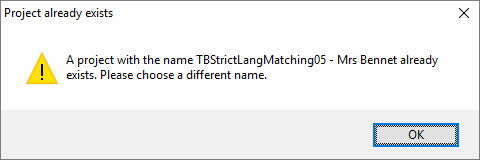Import a new handoff package
A memoQ handoff package is a file that contains an entire project for you. This project is part of a larger project: the handoff package contains the documents that you need to work on. The package also contains the translation memories, term bases, and all other resources and settings that you need to set up the project.
File extension: The name of a memoQ handoff package ends in .mqout.
Package from a server? If you were told that you need to download a package from an online project, use the Check out online project command instead.
You can use memoQ translator pro to work on a handoff package.
A client - a project manager - sends a handoff package when they need to send work to translators and reviewers - but they don't have memoQ server. The project manager needs the project manager edition of memoQ. There they can put together a master project, and assign documents to translators. Then they hand off the project. memoQ will create handoff packages - package files - for each translator and reviewer.
Then the client - the project manager - sends the handoff packages to the translators and reviewers in e-mail.
When a translator imports a memoQ handoff package, memoQ creates an entire project.
When the project manager makes changes to the master project, they can update the handoff packages, and send the updates in new package files. When the translator or the reviewer imports an update package, memoQ will find the original project, and update the translator's copy. This all happens automatically.
When the translation is finished, the translator can export a delivery package. That is another package file that has the .mqback extension. The translator e-mails the package to the project manager. The project manager opens the delivery package in memoQ. memoQ finds the master project, and updates it from the delivery package.
How to get here
- When you receive the memoQ handoff package, save it in your Documents folder.
- Double-click the icon of the handoff package file. memoQ starts, and opens the Import handoff package window.
Or:
- Open memoQ.
- On the Project ribbon, click Import package.
- Find the folder where the handoff package file is. Double-click the icon of the package file. The Import Handoff package window opens.

What can you do?
Before creating the project for you, memoQ displays the name of the project, and the folder where the project files go.
Normally, you would leave these as they are, and just click OK to import the project.
But:
- If you are importing the same handoff package file for a second time, you need to change the name.
- If you are running low of free space, and the package is large, you may need to save it to another drive.
memoQ uses the two boxes as follows:
- Project name: The default name comes from the handoff package itself. You can freely change this or type another name.
- Project directory: The location and name of the folder where memoQ creates the local project. To change the folder, click the ellipsis
 button next to the folder path.
button next to the folder path.
memoQ keeps track of the handoff packages you import on your computer. If the same handoff package was imported earlier on your computer, you receive this message if you just click OK in the Import handoff package window:

Click OK to return to the Import handoff package window. In the Project name box, change the name, and click OK again.
When you finish
To start importing the handoff package: Click OK. When the import is finished, memoQ opens the project in Project home.
To return to the Dashboard, and not import the handoff package: Click Cancel.
After the translation is finished: Export delivery package
When the translation is finished, you need to export a delivery package:
- Open the project that you imported from a handoff package.
- In Project home, choose Translations.
- Select the documents you want to send back.
- On the Documents ribbon, click Deliver/Return. A Save as window opens.
- Choose a folder and a name for the delivery package. The file name will end in .mqback.
- Open the folder where you saved the delivery package. Attach the package file to an e-mail, and send it to your client or your project manager.
You can send incomplete document: The documents don't have to be fully translated. You can send a partial delivery.